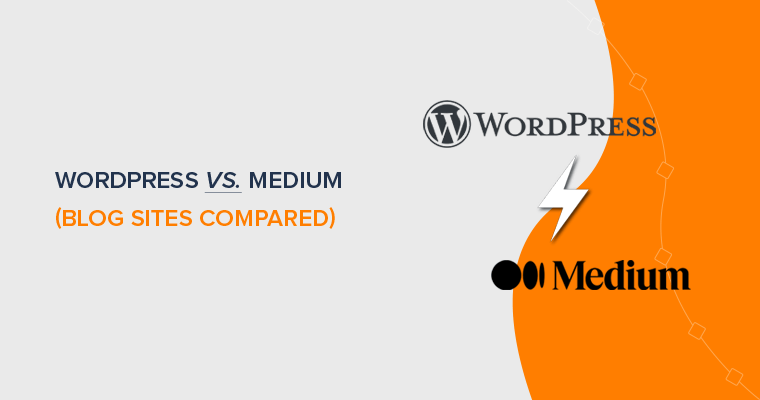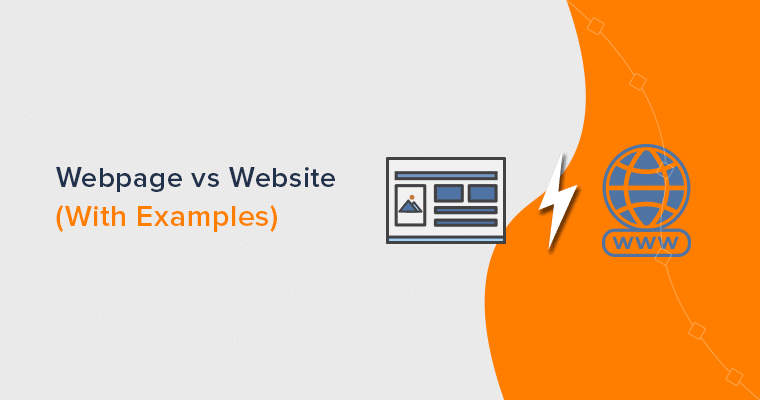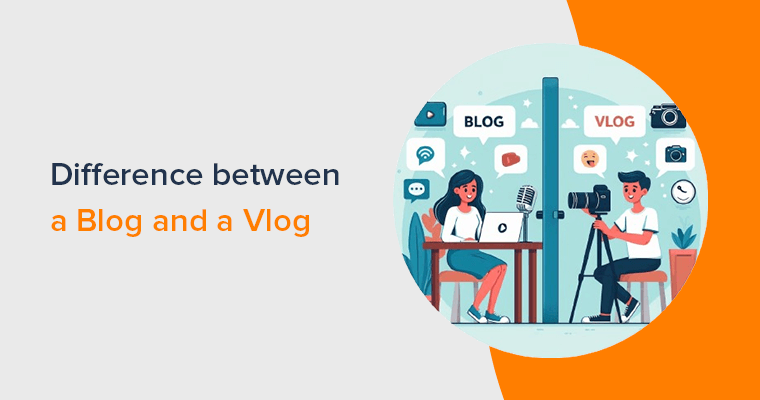Are you trying to create your blog? Not sure if you should use WordPress vs Medium for your blogging platform. We’ll guide you through this article.
When starting a blog for the first time, it may be hard to choose which platform your blog should live on. You might have heard about popular blog platforms like Wix, WordPress, Medium, and many others. All of these sites have a lot in common and many differences too.
In this article, we’re talking about two well-known blogging sites, i.e., WordPress and Medium. Both of these platforms are perfect for sharing content online. However, they’re greatly different from each other.
Here, we’ll compare WordPress vs Medium and help you choose one over the other. Let’s begin!
A) WordPress and Medium -Introduction
Blogs are really popular types of sites in use. Whether you want to promote your brand and products or simply write about your hobby, then starting a blog is the best way.
To create a blog, you can use WordPress or Medium. Let’s start their comparison with some basic introduction.
What is WordPress? – Overview
WordPress is a popular open-source software useful for creating your own website or blog. This platform offers a variety of services and features to create beautiful blogs with advanced blogging tools.
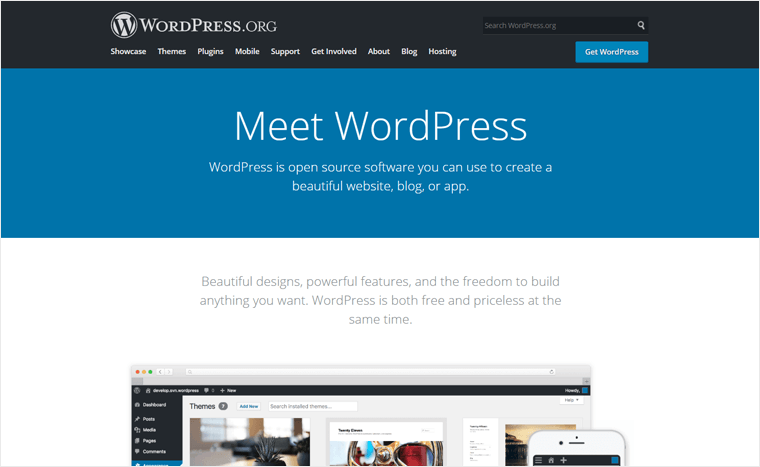
WordPress was first designed for bloggers, but now it is used to create websites, blogs, eCommerce stores, and more. Without a single coding knowledge, you can create and maintain your blogs. It has a simple user interface so that even beginners can quickly learn and use WordPress.
Before we get started, it should be mentioned that there are two versions of WordPress. The self-hosted WordPress.org and the fully hosted WordPress.com.
The .org website provides software which you should host on your own server, whereas the .com offers a complete site-building platform with hosting services included. To learn more, check our full comparison article WordPress.com vs WordPress.org.
This article compares Medium specifically to the self-hosted version of WordPress, i.e. WordPress.org.
What is Medium? Overview
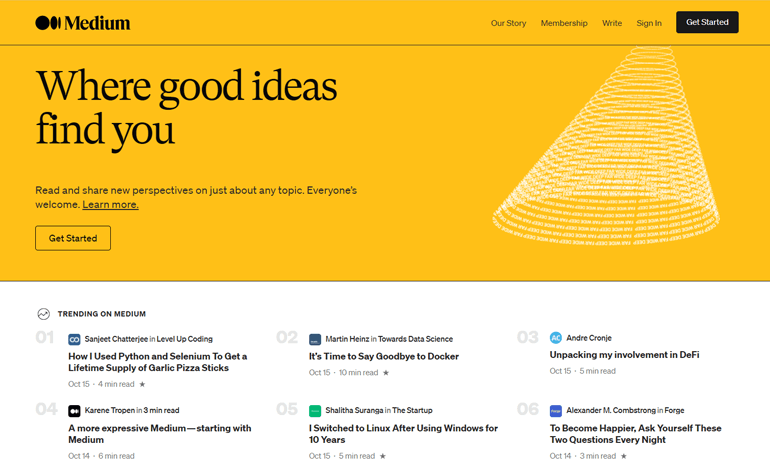
Medium is a simple, social publishing and blogging platform where people can easily write, publish, and share their ideas and insights. Anyone can sign up and start writing articles, blog posts, stories, and more.
This platform allows reaching your content with a large number of audiences. Moreover, you can take your social media followers to your Medium account as an audience by linking the Medium account with social media profiles.
B) Creating a Blog on WordPress vs Medium
Starting and creating a blog on both WordPress and Medium isn’t very complicated. Let’s take a look which of these platforms does it better.
How to Start a Blog with WordPress?
WordPress is the most user-friendly CMS platform to create blogs and other websites. Setting up a WordPress blog doesn’t require in-depth knowledge or hire a developer.
Here are the things you’ll need when setting up WordPress for the first time:
- WordPress Hosting.
- Find and purchase a domain name.
- Install WordPress
- Log in to WordPress and write your blog
First of all, you need to go through more steps like buying a hosting account and domain name. Web hosting is a service that provides connectivity and features to make your website available on the web. Whereas, domain name is your site’s name or address. For example, www.sitesaga.com is our site’s domain name.
You can use any hosting services of your choice like DreamHost, Bluehost, SiteGround, etc.
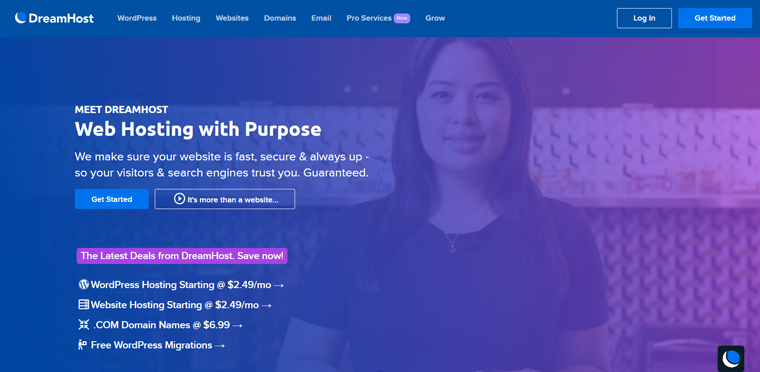
These companies also provide the domain name. But the domain renewal price can be higher. So, it’s better to register your domain from a domain company like Namecheap.
After you’ve purchased hosting and domain, you need to install WordPress and set up your site. With top hosting companies like Bluehost, DreamHost, SiteGround, etc., you can get WordPress pre-installed when you purchase WordPress hosting. Or, you can get a 1-click WordPress install option. So, it’s really easy.
Once you’ve WordPress installed on your hosting account, you can log into your WordPress site’s admin area, also called the WordPress dashboard. You’ll see something like this.

To create a new blog post, navigate to Posts> Add New from the WordPress dashboard. Next, you can create and edit your article. Once everything’s done Publish your content from the top-right bottom.
How to Start a Blog with Medium?
Getting started with Medium is even easier than starting with WordPress. With a few seconds, your Medium account gets ready, and you can write and publish your content.
First of all, you need to create a Medium account. Go to Medium.com, click on the ‘Get Started‘ button, and sign up with any account, i.e., Gmail, social media account Facebook, or email etc.
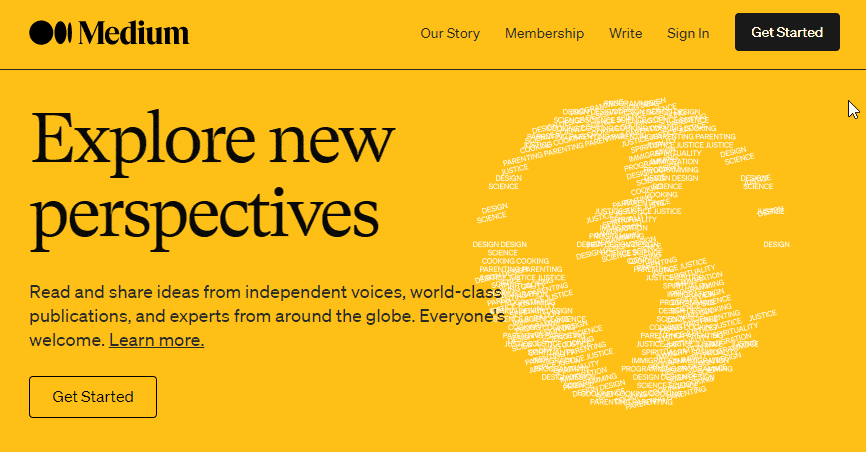
It is best recommended to create or sign up for the Medium account with your social media accounts because your friends from the social media sites will automatically be followers for your Medium account.
Once the sign up is completed, you’ll see something like this.
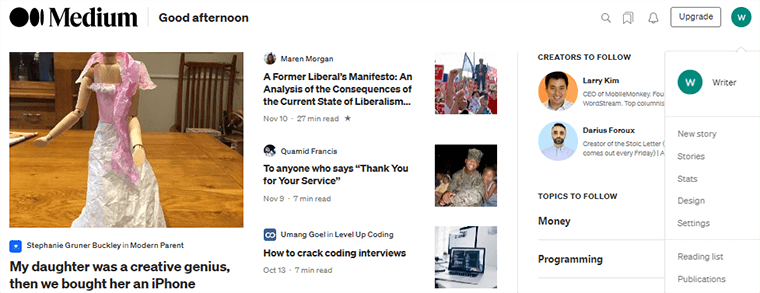
Click on your image on the top-right side where you’ll get an option, ‘New Story‘. After that, you’ll see an area where you can write and share anything you want. Once your content is complete, click on the Publish bottom at the top right. Now your content is available publicly.
Winner?
Medium is quite simple to use and also doesn’t require any technical knowledge. Also, the setup process is quite easier and quick as compared to WordPress.
C) Cost Comparison Between WordPress vs Medium
Cost is an essential factor when it comes to choosing a platform for blogging. Let’s compare the price of blogging on WordPress and Medium and see which platform is affordable.
Cost of Building a Blog on WordPress
WordPress software is free to install and use for everyone. You can download its latest version from its official site WordPress.org. It also offers 8000+ free themes and 58,000 free plugins that can be used for free on unlimited sites.
However, the main cost associated with WordPress is web hosting, domain name, premium themes, premium plugins, and other maintenance. Before getting started with WordPress, you need a web host service and domain name to make it accessible to people around the world.
Basic or cheap hosting service starts from $2.59/mo, whereas if you wish to choose a quality host, it may cost up to $100/mo. Similarly, domain name ranges from $12/year.
Not to mention, some top web hosting companies like Bluehost, DreamHost offer a free domain name when buying a web hosting service. So, if you’re looking for cheap and affordable web host plans, these offers are the best.
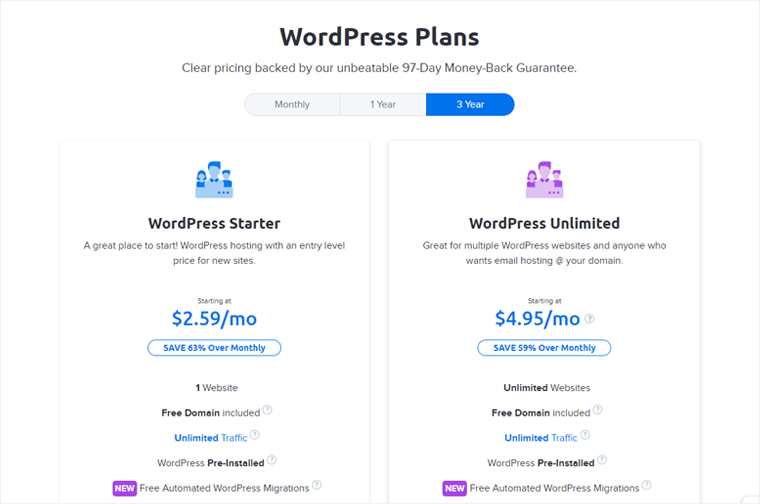
For example, with DreamHost, you can start a website as low as $2.59/mo. as it includes a free domain also. If you use free WordPress theme and plugins, then it’s the total cost.
But if you want to use premium themes and plugins, then the cost can go up. You may need paid products if you want more customization options on your blog. Premium plugins are available for about $49/year, and premium themes cost around $60/year.
Cost of Building a Blog on Medium
Creating and signing up for the Medium account is free of cost. Moreover, you can create or write your content without any cost and publish it to the public. You can also read the content or stories of other authors or writers without any single charge.
However, to get access to top writers and others’ best stories of Medium, you’ll need to become a Medium member. Once you’re a Medium member, you’ll get unlimited access to Medium stories and posts, excess to Medium’s monthly magazine, and a lot more.
The membership plan ranges from $5/month or $50/year. You can choose the plan according to your need.
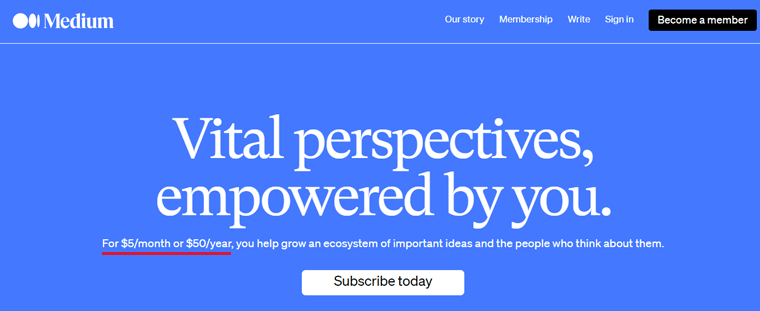
Besides that, there is no any plans or charge cost with Medium.
Which is cost-effective?
If you’re looking for a free of cost platform, then Medium is the right choice for you. But if you want a custom website with your own domain name, then WordPress is also a very cost-effective platform.
D) WordPress vs Medium – SEO Comparison
Search Engine Optimization (SEO) is a popular marketing technique used to improve a site’s ranking on search engines like Google. Better ranking on search engines drive more traffic to the site or blog, and it can further lead to more sales and more revenue.
Both WordPress and Medium have SEO tools, settings options, plugins, and many other advanced features that help optimize SEO. Find out which is better for you!
SEO for Your WordPress Blog
By default, WordPress has some excellent SEO built-in features. It has been one of the best SEO-friendly CMS.
By default, WordPress offers SEO-friendly content publishing options like posts, pages, etc. They have title tags wrapped in H1 tag, plus other heading tags which you can use to add subtitles on your content.
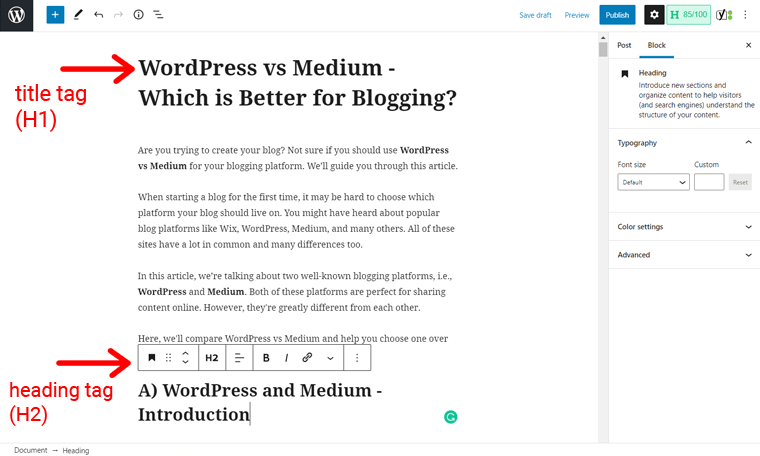
Not only that, you can also create simple, short, and attractive permalinks for your pages and blog articles. Those are SEO-friendly URLS as they are easy to use for both users and search engines.
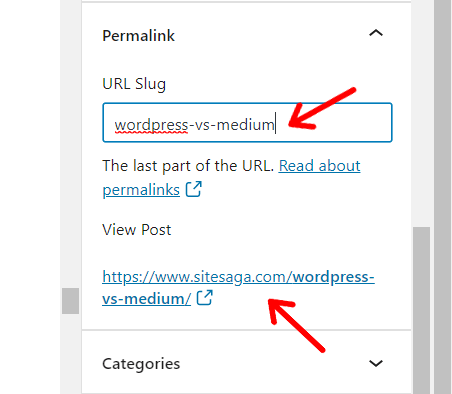
It also allows you to optimize your images for better SEO. You can add Alt Text, title, caption, and description for every image. They help to make your images SEO-friendly.
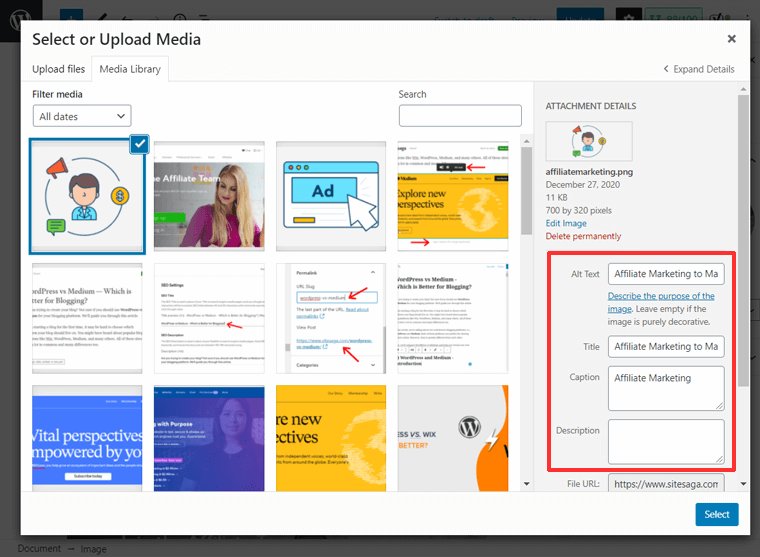
Besides, WordPress has tons of SEO plugins to help you rank your site in search engines. For example, you can use plugins like Yoast SEO, Rank Math, All in One SEO, etc., to optimize the WordPress site.
The SEO plugins offer suggestions to choose or select keywords, adding links, creating text or content, optimizing meta descriptions, etc.
SEO for Your Medium Blog Posts
Unlike WordPress, Medium is a hosted platform where you can publish blog posts but you don’t own the blog. The domain is medium.com and you can simply publish your articles on it. Meaning, everything SEO is managed by Medium.com itself.
Medium has really good SEO settings. Like in WordPress, you can add a title, subtitle, or subheading title essential for SEO. You can add images, videos, or embed any type of content with ease.
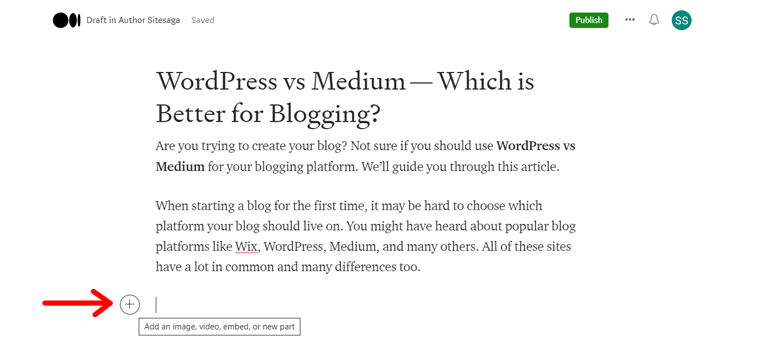
After you add images, you can add Alt text for images as well as image captions to make your images comprehensive.
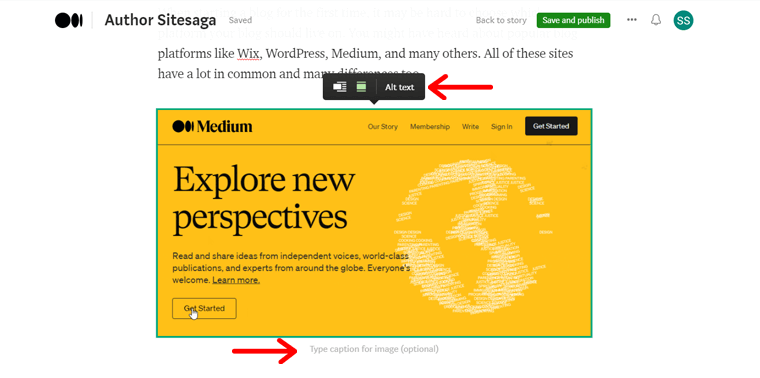
When publishing, you can customize the SEO title, meta-description, URL of your post.
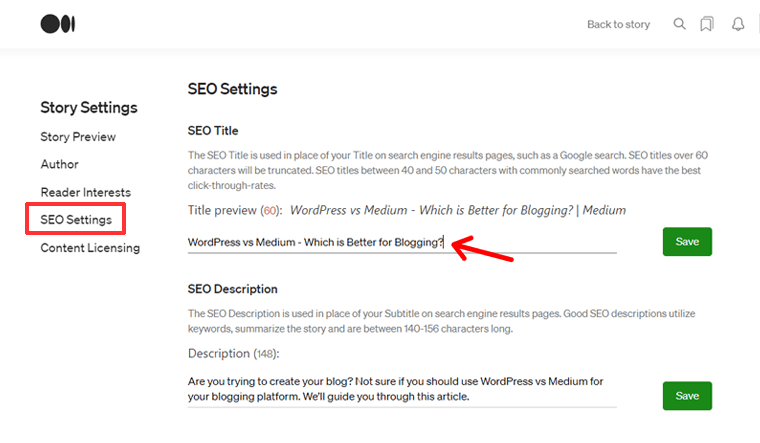
All these features are the key ingredients for a higher SEO ranking.
In addition, Medium has huge built-in audiences, sometimes minimal search engine optimization also works.
WordPress or Medium is Better for SEO?
Both WordPress and Medium have advanced tools, plugins, and setting options for higher SEO ranking. However, they’re very different in who owns the blog.
You own your WordPress blog and you’re responsible for everything SEO. In the case of Medium, you don’t actually own the blog and most of the settings are done by Medium. You’ll simply use their platform to publish your articles.
So, if you want to run a long-term SEO strategy for your brand, then WordPress is the best. But if you’re just a part-time hobby writer who wants to write sometimes, then Medium is a good platform for you.
E) WordPress or Medium for Making Money (Monetization)
Want to make money online? Creating a blog on WordPress or Medium offers you tons of ways to earn money. Here, let’s compare whether WordPress or Medium has better monetization options.
Monetization Options on WordPress Blog
Nowadays, many people are starting a WordPress blog with the intention of making money. WordPress gives plenty of options for earning money from a WordPress blog.
In fact, there is no specified amount of money you can make from WordPress. The more you work hard on your content and blog, the more you’re paid accordingly. Quality content leads to a high amount of traffic, which is also a way of making money from WordPress.
Now you may be wondering how to exactly make money from the blog? Here’s the answer! You can earn money from WordPress by displaying ads, selling products, sponsored posts, etc.
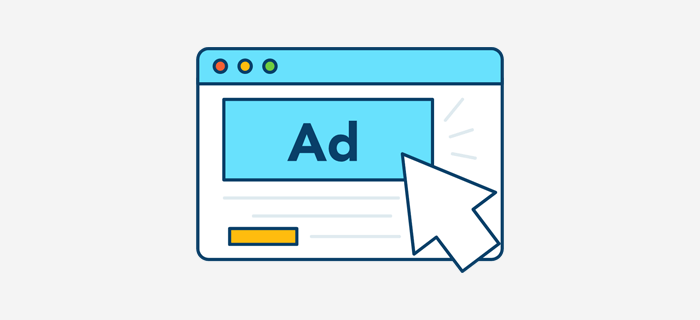
As a blogger, affiliate marketing is the best way to make money. It’s the process of promoting other products from your WordPress website where you’ll get a commission after your visitors buy those products.

You can promote any product of any niche via your blog. For example, WordPress hosting, themes, plugins, etc. if you’re blogging about WordPress. When your audience purchases those products using your affiliate links, you’ll get a commission.

In a nutshell, monetization options for a WordPress blog are limitless. Create quality content that’s useful to your audience and monetize it with affiliate links, ads, etc. You can earn as much as you wish to!
Monetization Options on Medium Blog
With Medium, you can monetize your blog by joining the Partner program.
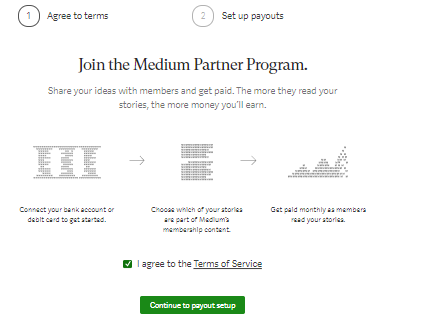
Joining the Partner program is free. When you write and publish your content, you’ll start earning money once Medium members read your content on Medium. The reading time of your content by the Medium members also matters on the monetization value.
Besides that, you can earn money through Medium from affiliate marketing, online promotion, and the high traffic rate that comes to your content.
Medium or WordPress Better for Monetization?
WordPress beats this round when it comes to monetization. WordPress gives a lot of options if you want to earn money from it.
F) Blog Design Options on WordPress vs Medium
The appearance and design of a blog are essential to attract your readers and make them stay on your blog. WordPress and Medium have different blog design options. Which platform does it better? Let’s check it out!
Blog Design Options on WordPress
WordPress itself is a large platform with several blog design and customization options. First, you can change your blog’s overall design and customize it as per your wish using a WordPress theme.
It has a huge number of free and paid themes available. There are over 8000+ free themes available on WordPress.org, which you can download and use completely free of cost. You can access them directly from your dashboard (Appearance>Themes>Add New).
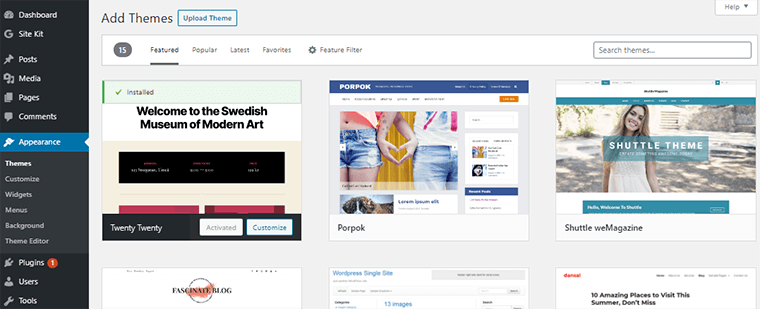
Choose the theme that is simple and matches your blog title, responsive, easy to customize, SEO-friendly, and secure. For more details, check our article on how to choose a WordPress theme.
Other features WordPress blog offers are adding images, links, videos, image alternate text, featured images and videos, etc. You can also use a simple drag and drop WordPress page builder to design landing pages in WordPress.
Moreover, you can add more powerful features and functionalities to your site using plugins. We’ll explain the plugins in ‘section G’ below.
Blog Design Options on Medium
As stated above, Medium is ready to use blogging site, the overall appearance of your blog articles, and profile looks like others on this platform.
Precisely, it comes with a beautiful, minimalist, and clean design interface but you cannot do much change in it. You can do some simple changes like fonts, colors, and header of your profile.
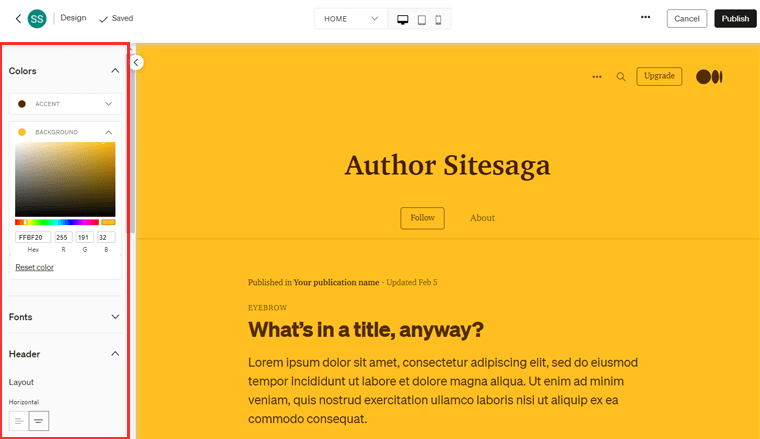
The Medium doesn’t have themes and templates, like WordPress. However, the simple design of Medium is also worth looking at.
About the design of your content, it gives options to add images, videos, links, etc.
WordPress or Medium Has Better Design Options?
WordPress is a clear winner here. With plenty of themes and templates, WordPress blogs are easy to modify and customize.
G) Medium vs WordPress – Features, and Extendability
Both Medium and WordPress are loaded with different features and functionality of their own. Let’s look and decide which platform meets your needs.
Features and Extendibility of Your WordPress Blog
As mentioned earlier, WordPress itself is a huge platform with a wide range of features and functionality to create a simple blog to a complex website.
Similar to themes, it has a wide collection of plugins. WordPress plugins are the extension tools that help to add additional features and functionalities to your site.
There are over 58,000+ free plugins available, which you can download and use completely free of cost. Similar to free themes, you can install any of these plugins to your blog right from the dashboard (Plugins>Add New).
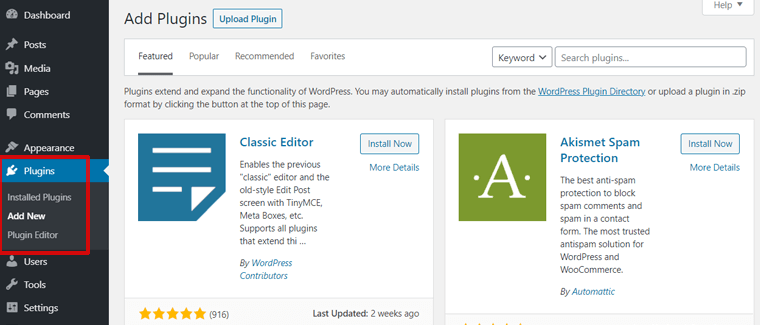
Using plugins, you can add any type of functionality. For example, you can create a contact form on your blog using contact form plugins like Contact Form 7, WPForms, etc.
Similarly, you can also add email popups, live chat, contests, etc. using WordPress lead generation plugins. Make your blog multilingual using multilingual plugins. Make your blog SEO-friendly using SEO plugins.
There are both free and premium plugins that let you extend features and customize your blog according to one’s choice. For more details, check out our list of best WordPress plugins for blogs and the most popular WordPress plugins.
Features and Extendibility of Your Medium Blog
Medium is a straightforward blogging platform with a clean and light design interface. The style of writing and creating stylish posts and publications is very simple. It allows creating stories, series, publications, and a lot more in a quick interval of time.
This platform also allows you to repost the content that you wrote elsewhere. It gives an option to import your content from any place on the web.

Best of all, Medium will automatically backdate the story to the original published date and add a canonical link. With canonical tag, search engines see the imported content as the same content and won’t penalize you.
Other features include social media integration; social sharing options, social login, etc.

Plus, it’s mobile responsive, has built-in audiences, minimalistic UI (user interface), and many more. Not to mention, if your content is good and real, then there’s a high chance that big publishers will discover you.
WordPress or Medium Which is More Feature-rich & Extendible?
No one can beat WordPress when it comes to features and functionality. Medium is also good but has limited features and functionality. So, WordPress is a clear winner here.
H) WordPress vs Medium – Pros & cons
WordPress for Blog: Pros & Cons
Pros of WordPress:
- Being an open-source platform, WordPress gives you full control of your site and blog.
- With its in-built blogging feature, you can add a new post, edit, add image, and more in a short time, and doesn’t require technical knowledge to get started.
- WordPress has better SEO capability to rank your content higher in search engines.
- It has a variety of functions and features to make your blog unique. WordPress plugins and themes also play a main role in making your blog’s appearance awesome.
- Using WordPress import/export plugins, you can even import WordPress data and users’ comments to a new host or domain name.
Cons of WordPress:
- When using WordPress, it can be challenging for new beginners where they have to deal with host services and purchasing domain names.
- Premium plans like hosting service, domain name, plugins, themes, and others can be a little costlier.
- If themes and plugins are not properly chosen, it may decrease your content and image loading speed.
- Since it offers a lot of customization features, beginners find it hard to use.
- WordPress is a self-hosted platform, so there may arise some security issues if the platform is not handled seriously.
Pros and Cons of Using Medium for Blog
Pros of Medium:
- Medium is easy to use and setup. Moreover, it is a beginner-friendly blogging platform.
- This platform helps to reach your content to a huge mass of people worldwide. It is said that Medium has approximately 100 million monthly readers.
- With built-in social networking features, audiences from your social media sites will be followers for Medium.
- Medium offers multiple customization options along with a drag and drop editor.
- Since it is a fully hosted platform by Medium servers, you don’t need to worry about security issues.
Cons of Medium:
- Medium is owned by a private company, ‘A Medium Corporation, ’ which doesn’t allow you to own your content. They have full ownership and control over your blog. Someday if they decide to turn off the site or delete your content, you’ll be able to do nothing.
- It provides a limited number of article formatting options.
- If you want your content to be featured among a large number of audiences, you must promote your content from other platforms or social sites.
- Medium often displays other author articles below your own story. This might distract the readers and move them to other authors’ stories.
- You can export Medium data only in HTML format, making it difficult to export the data in WordPress and other platforms.
Conclusion
That’s it!
Before wrapping up, let’s look – Which platform should you choose and which not?
Why should you choose WordPress over Medium?
With a wide range of features and functionality, WordPress is the number one solution to create everything from small blogs to large websites. If you want to find something professional with advanced design and take full ownership of your side, go with WordPress.
WordPress gives plenty of options to monetize your site compared to Medium when it comes to making money online. So, if your goal is to make money with the blog, WordPress is the best choice.
Besides blogging, you can do a lot more with WordPress, like designing an eCommerce store or add forums and a lot more. The plugins and themes of WordPress let you add new functionality with a single click, which is not available with Medium.
Why should you choose Medium over WordPress?
Medium is the best solution for the one who is looking for a platform for only blogging and no other. Starting and creating content is pretty much easier and is done in a few minutes. Like WordPress, you don’t have to deal with host service, domain name.
Also, creating content with the medium is also simple and gives a good user experience. WordPress has a number of design and customization options, which may not be a beginner-friendly to all.
If you’re looking for a cost affordable or free platform, Medium is the one for you.
Having a built-in audience allows your content to reach a lot of people. Obviously, quality content is always ranked at the top. But one more advantage with Medium is, people with large amounts of social media followers also have a high chance of ranking at the top. This feature is missing in WordPress.
Wrapping UP
We hoped that this article helped you distinguish between WordPress and Medium. They have somewhat similar functions with lots of differences from setup to monetization features and more.
Do we miss something important? If you are planning to use one of the above platforms, please share your experience with us. If you have any queries or any confusion, please feel free to comment in the section below.
Lastly, please check our article on WordPress vs. Blogger.
Please follow us on Facebook and Twitter for fresh and exciting content.
